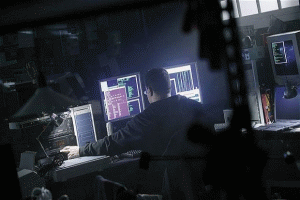China builds computer network impenetrable to hackers
China will soon have the world's most secure major computer network, making communications between Beijing and Shanghai impenetrable to hackers and giving it a decisive edge in its quiet cyberwar with the United States.
 China is building the world’s first long-distance quantum encryption network, a 1,200-mile line that will be theoretically unhackable.
China is building the world’s first long-distance quantum encryption network, a 1,200-mile line that will be theoretically unhackable.
In two years' time, a fibre-optic cable between the two cities will transmit quantum encryption keys that can completely secure government, financial and military information from eavesdroppers. "We learnt after the Edward Snowden affair that we are always being hacked," said Prof Pan Jianwei, a quantum physicist at the University of Science and Technology of China (USTC) in Hefei, who is leading the project. "Since most of the products we buy come from foreign companies, we wanted to accelerate our own programme," he added.
However, Prof Pan said eventually all communications in China, down to storing photographs on cloud servers, could feature quantum encryption. "Ten years ago it was not so easy to get sufficient funding to support theoretical research, but since 2006 and 2007 when the economy really went well, they have been putting more money into research and then it really sped up," he said.
But the US National Security Agency reportedly has computers powerful enough to crack encryption codes and is developing a quantum computer that will be able to run calculations so quickly that it can easily defeat encryption. That means that, if it is able to tap fibre-optic cables and copy data travelling down the line, its hackers should be able to unlock the information.
Quantum encryption relies upon writing the encryption codes, or keys, upon single photons of light (a quantum particle). If a hacker tries to eavesdrop on the line, they will disturb the encoding of the photon and be detected. Consequently, said Prof Pan, it should provide perfect security. "Of course, although quantum communication can in principle provide absolute security, in practice, we have to prove it thoroughly by various hacking tests. So we are inviting the finest hackers to attack our system," he said.
"China is putting itself in the position of having secure private information that other countries will not be able to tap," he added. At least six other networks transmitting quantum encryption keys have been built around the world, including one run by the US Defence Advanced Research Projects Agency in Massachusetts. But all are on a much smaller scale. China's progress, which will also include the launch in 2016 of a satellite dedicated to quantum communication research, is likely to trigger a global race. "We heard Nasa is building a quantum line between Los Angeles and San Francisco," said Prof Pan. "And IBM and Google are both investing heavily."
However, Prof Pan and Prof Laflamme said the development of the quantum system still required a great deal of work. Photons can only travel for a short distance, which means the new Beijing to Shanghai line will include 20 nodes, each of which is vulnerable to hackers. And the rate of transmitting keys remains slow. "At the moment, it is only useful for a large user, like a government,” said Prof Pan.
Axarhöfði 14,
110 Reykjavik, Iceland














